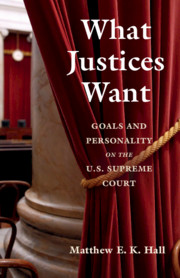Book contents
- Frontmatter
- Dedication
- Contents
- List of Figures
- List of Tables
- Acknowledgments
- 1 Who They Are and What They Want
- 2 Goals and Personality
- 3 Measuring Justice Personality
- 4 Agenda Setting
- 5 Opinion Assignments
- 6 Intra-Court Bargaining
- 7 Voting on the Merits
- 8 Separate Opinions
- 9 Behind the Black Robes
- Appendix A Agenda-Setting Analysis
- Appendix B Opinion Assignment Analysis
- Appendix C Intra-Court Bargaining Analysis
- Appendix D Voting on the Merits Analysis
- Appendix E Separate Opinion Analysis
- Notes
- Index
Appendix C - Intra-Court Bargaining Analysis
Published online by Cambridge University Press: 22 August 2018
- Frontmatter
- Dedication
- Contents
- List of Figures
- List of Tables
- Acknowledgments
- 1 Who They Are and What They Want
- 2 Goals and Personality
- 3 Measuring Justice Personality
- 4 Agenda Setting
- 5 Opinion Assignments
- 6 Intra-Court Bargaining
- 7 Voting on the Merits
- 8 Separate Opinions
- 9 Behind the Black Robes
- Appendix A Agenda-Setting Analysis
- Appendix B Opinion Assignment Analysis
- Appendix C Intra-Court Bargaining Analysis
- Appendix D Voting on the Merits Analysis
- Appendix E Separate Opinion Analysis
- Notes
- Index
Summary
Tables C.1–C.5 report the results of the intra-Court bargaining models. The data consist of 48,524 memoranda circulated between the 13 justices who served on the US Supreme Court during the 1969 through 1985 terms. The data were derived from the Burger Court Opinion Writing Database. I conducted separate analyses for the following types of memoranda: majority opinion drafts, separate opinion drafts, opinion suggestions, wait statements, and join statements. The first model, examining majority opinion drafts, includes only the justice in each case who wrote the opinion of the Court (N = 2, 136). The other models include every justice in each case who did not write the opinion of the Court (N = 16, 086). The dependent variables are the number of each memo type sent by each justice in each case; therefore, I used regression models appropriate for count data. To examine majority opinion drafts and wait statements, I employed a multilevel Poisson model with random intercepts for justice, which assumes a Poisson distribution and accounts for potential interdependence between justices. However, a likelihoodratio test indicated overdispersion (suggesting that the Poisson regression model is inappropriate) for separate opinion drafts and opinion suggestions; therefore, I employed a negative binomial regression model for these dependent variables. Additionally, a likelihood-ratio test indicated that I cannot reject the null hypothesis that the multilevel model is not an improvement over the standard model for separate opinion drafts and join statements; therefore, I excluded the random intercepts for justice in these models. All of the models include the justices’ SCIPEs for the Big Five (Extraversion, Conscientiousness, Agreeableness, Neuroticism, and Openness), as well as the following control variables:
• A dichotomous indicator taking on the value one for the chief justice and zero otherwise (Chief Justice).
• A dichotomous indicator taking on the value one for justices in their first term on the Court and zero otherwise (Freshman Justice).
• The number of amicus curie briefs filed in each case, standardized within the term the case was filed (Amici Attention).
- Type
- Chapter
- Information
- What Justices WantGoals and Personality on the U.S. Supreme Court, pp. 161 - 166Publisher: Cambridge University PressPrint publication year: 2018



